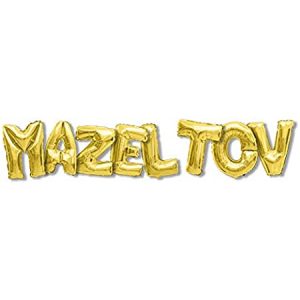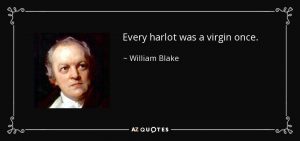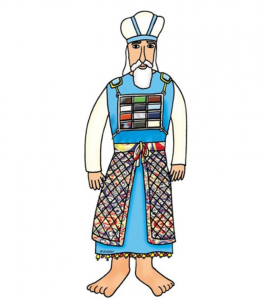The Baker & The Beauty and The Koihen Godol (High Priest) & The Virgin
*************************************************************************************************
 A few mazel tov shout outs, all for grandchildren born to friends; in no particular order, here we go.
A few mazel tov shout outs, all for grandchildren born to friends; in no particular order, here we go.
Mazel tov to our friends Malki and Phil Rosen & Mindy and Alan Peyser (machatunim) upon the birth of a granddaughter born to their children Rachel and Shai Peyser. Welcome to the world Isabelle Goldie; you will surely bring much joy to your parents, grandparents, great grandmother Sara Leifer, great grandparents Paul and Susie Peyser, and your entire extended family.

A shtikel (not very) belated mazel tov to our friends Aliza and Shloime Liechtung upon the birth of a grandson born to their children Yonina and Max Stern. Welcome to the world Chaim (Henry) Stern. May you be a source of much nachas to your parents, grandparents, great- grandparents (big mazel tov to Charlotte Liechtung and the entire extended family.
And in the what else is new department, mazel tov to our friends Judith and Shlomo Gottesman upon the arrival of a granddaughter born to their children Shayna and Ezzi Unger. A special shout out mazel tov to great grandmothers Balance Lerer and Sondra Gottesman. Baby Unger will be named this coming shabbis and may she be a great source of nachas and joy to her extended family.
****************************************************************************************************

Are these two headlines at all related? Not! Now that I have your attention, and now that a plug has been given to The Baker & The Beauty (Netflix), a show the heylige Ois and eishes chayil enjoyed just last week, let’s talk about the Koihen Godol (High Priest) and his virgin wife. The RBSO -in this week’s parsha- commands that the Koihen Godol may only marry a virgin. Mamish azoy? Indeed so. Let’s get right into the parsha and read Pisukim 13 and 14 of Perek 21 which address restrictions on the Koihen Godol’s choice of a life partner.
13- He may marry only a woman who is a virgin.
וְה֕וּא אִשָּׁ֥ה בִבְתוּלֶ֖יהָ יִקָּֽח׃
14- A widow, or a divorced woman, or one who is degraded by harlotry—such he may not marry. Only a virgin of his own kin may he take to wife—
אַלְמָנָ֤ה וּגְרוּשָׁה֙ וַחֲלָלָ֣ה זֹנָ֔ה אֶת־אֵ֖לֶּה לֹ֣א יִקָּ֑ח כִּ֛י אִם־בְּתוּלָ֥ה מֵעַמָּ֖יו יִקַּ֥ח אִשָּֽׁה׃
Not one but twice in two consecutive pisukim, the RBSO instructs that the Koihen Godol marry a virgin. He is of course also forbidden to a harlot, and to stam azoy a divorced woman; his only choice of a wife must be a virgin. What makes a harlot? To find out exactly or maybe not, let’s see what the heylige Gemora has to say.
A Zoinah (harlot) is generally defined as a woman who had relations with a man out of wedlock. However, the Tana’im argue about the exact definition of who is a Zoinah. Some say that a Zoinah is any woman who is unable to have children, since it is not the manner for men to marry such a woman. She is prohibited to a Kohen whether she actually had relations with a man out of wedlock or not. Some say that a Zoinah is any woman who had relations with a man out of wedlock, i.e. without Kidushin, or, according to others, any woman who made herself available for all (without Kidushin). Others say that the only woman who is considered a Zoinah is an “Eshes Ish,” a woman who committed adultery. The Chachamim (Yivomis 61b) say that a Zoinah is a woman who had relations with a man to whom she is prohibited. And the bottom line? Which of the “some say” do we follow? The Halocho follows the Chachomim, who say that a Zoinah is a woman (at least three years of age) who had relations with a man to whom she is prohibited. Lest you think the case is closed and the definition clear, it’s not. Our sages continue the argument about which particular law she is breaking that renders her a harlot, ober that for another day. Back to the virginity requirement.

What happened if he got fooled? Must he divorce her? That too is hotly debated, and that topic for another day. For today, the bottom line is that the Koihen Godol cannot marry or a harlot, nor a divorcee. Ober, why would the RBSO care to whom the Koihen Godol was married? In any event, of course there are many sages who proffer on this topic, ober this week, in our 11th time around the parsha, we will focus on but one blow your mind pshat from one sage; believe me it’s enough to astound most readers and leave a few heads spinning. Halt zich eyn (control yourselves), we will get to it soon.
Welcome to Parshas Emor, a singleton this week, but action and mitzvah packed with either 56 or 63 different commandments (depending on whom you ask), and 16 of them relevant only to kohanim. Not to worry: we’re back with yet another doubleheader next week to close out the book of Leviticus. As an aside, our parsha has the most pisukim of any in Sefer Vayikra, and just a tad under 40% of them, deal with specific instructions to and about the kohanim. They address the regular poshite priests (aka: the koihen hedyot) and to the exalted Koihen Godol, the big kahuna. Seemingly he was the most important member of the entire Jewish community. He was? It was on his shoulders to perform the avoido (service) of Yom Kippur. It was on his shoulders to ask the RBSO to forgive the Yiddin for their transgressions in the previous year. Judging by the way the Yiddin acted -and we only know what’s told to us- he had his work cut out for him. As another aside, Yom Kippur was also the time for the Koihen Godol to seek forgiveness for his own sins. Lest you think otherwise, the heylige Novee records quite a few interesting stories about rogue kohanim, ober that for another day.
Is it emes that the Koihen Godol was in fact the most important person as a result of his specific task of being empowered to enter the ‘Holy of Holies’ where only he could perform the rituals during which he asked the RBSO to forgive the indiscretions of the Yiddin? Or, might it just be the case that the Koihen Godol’s wife, his eishes chayil, a virgin on the wedding night, was of even greater importance? Let’s quickly address that last question and begin here.
Who taka was the most important person in the Koihen Godol/wife relationship? He with all his power and seemingly direct connection to the RBSO through the utterance of the RBSO’s 72 letter name? Or, she the former virgin? The 72 letter what? And to answer that question, let us learn this shtikel Gemora which in Yoma 2A tells us azoy:
שִׁבְעַת יָמִים קוֹדֶם יוֹם הַכִּפּוּרִים מַפְרִישִׁין כֹּהֵן גָּדוֹל מִבֵּיתוֹ לְלִשְׁכַּת פַּרְהֶדְרִין. וּמַתְקִינִין לוֹ כֹּהֵן אַחֵר תַּחְתָּיו שֶׁמָּא יֶאֱרַע בּוֹ פְּסוּל.
MISHNA: Seven days prior to Yom Kippur the Sages would remove the High Priest, who performs the entire Yom Kippur service, from his house to the Chamber of Parhedrin, a room in the Temple designated specifically for the High Priest during that period. And they would designate another priest in his stead to replace him lest a disqualification due to impurity or another circumstance beyond his control prevent him from entering the Temple on Yom Kippur.
רַבִּי יְהוּדָה אוֹמֵר: אַף אִשָּׁה אַחֶרֶת מַתְקִינִין לוֹ, שֶׁמָּא תָּמוּת אִשְׁתּוֹ, שֶׁנֶּאֱמַר: ״וְכִפֶּר בַּעֲדוֹ וּבְעַד בֵּיתוֹ״, ״בֵּיתוֹ״ — זוֹ אִשְׁתּוֹ. אָמְרוּ לוֹ: אִם כֵּן, אֵין לַדָּבָר סוֹף.
Rabbi Yehuda says: The Sages would even designate another wife for him lest his wife die, as it is stated in the Torah portion of the Yom Kippur service: “And it will atone for him and for his house” (Leviticus 16:6); the Sages interpreted the term: His house, that is his wife. The priest must be married in order to fulfill this commandment. Due to the concern lest his wife die, another wife was designated to address that possibility. The Rabbis said to Rabbi Yehuda: If so, that this is a concern, there is no end to the matter, as what if the designated replacement wife dies? This possibility need not be a source of concern.
Shoin, we read from the Mishneh and what Rebbe Yehuda had to say, and we know what? We know that the Koihen Gadol could not serve in the Beis Ha-mikdash on Yom Kippur unless he had a wife. Moreover, the atonement of the entire Jewish people was dependent on this one woman who was willing to be the wife of the Koihen Gadol. No wife = no service. Grada, in our times it’s punkt-farkert (just the opposite)! Yes wife= no service, if you chap. Ober, from the words of Rebbe Yehuda we see azoy: that the wife of the Koihen Gadol had an importance equal to his own, since he could not fulfill his tasks without her. And the bottom line: if you’re married, or wish to marry a Koihen, and he has potential to become the Koihen Godol (just in case the Moshiach makes an appearance), you will be the more important spouse and the fate of the entire Jewish people is in your hands. That assumes of course that you were a virgin when the Koihen married you. The real news: Moshiach is not coming any time soon. Why not? Because our sages also teach us that in order for him to come, the Yiddin must observe two consecutive shabbosim; seemingly this has yet to happen. And hear this: as well, the Yiddin must stop speaking loshoin- horo. Case closed, plan accordingly.
Shoin, let’s get back the Koihen Godol, the virgin and explore what could have been the RBSO’s motivation when insisting that the Koihen Godol marry davka a virgin. Why would the RBSO care to whom koihanim are married? Are there such, or any restriction on Levites, or on the rest of the Yiddin? Not! Vus epes (specifically why), did He restrict the kohanim?
Efsher we can kler azoy: since the koihen served as the spiritual agent of the Jewish people in Divine service, he was required to live a life of complete innocence and purity. Therefore, the Toirah did not want him marrying a person previously involved in strife, innocent or not. That being said, why was it verboten for the Koihen Godol to marry a widow? Was it her fault that her husband died? What is it about her husband’s death that makes her unqualified to enjoy a blessed relationship with a Jewish High Priest? The bottom line: the RBSO did not provide reasons, nor does He have to. Fartig! Ober, our sages were once again left to ponder these rules and were in particularly fixated on the Koihen Gogol and the virgin. Several theories have been proffered, ober for today, let us focus on one answer that may initially disturb many. Ober not to worry as this pshat comes with a happy ending; not the one many are nebech accustomed to, if you chap.
Says the Chida, seemingly in the name of Rabbi Yehuda HaChosid (also quoted in Moishav Zekanaim Al HaToirah), azoy. The Koihen Godol was given many great spiritual powers. The most important of them -as mentioned above- was his duty on the holiest day of the year, Yom Kippur, to enter into the Koidesh Ha’kidoshim (Temple’s Holy of Holies), a place where no other living Jew was ever allowed. Ever! On Yom Kippur, he would also pronounce the intimate 72-letter name of G-d, which contained very profound powers. The RBSO has a 72- letter name? What is it? We don’t know! This knowledge is above our pay grade and would require a deep dive into the kabbolo before understanding that we can never understand it. Veyter. Our job is to believe what we were taught and what we were taught was azoy: indeed, among the RBSO’s names, is one “shaim ha’mifoirush,” a name the Koihen Godol only was to invoke during his service on Yom Kippur. Invoking the name during the service on that day empowered him to seek forgiveness for the people and for himself. The Yiddin depended on him. How did this name invoke work? We are taught azoy: Says the Daas Zekeinim mentioning a passage from the heylige Gemora (Yerushalmi), azoy: originally the Koihen Gadol would pronounce the Explicit Name of G-d out loud 10 times during the Yom Kippur Service. This powerful Name was normally not spoken, and most people did not even know how to pronounce it correctly. Why did the magic stop? Seemingly, the practice was stopped, because there were people who would listen to the Koihen Godol’s pronunciation of the Explicit Name of G-d on Yom Kippur and would write down the transliteration of that Name, so that they would have it available during the course of the year if they wanted to curse someone. The practice of audible pronunciation of the Explicit Name was stopped so that people would not be able to use this weapon. Well, blow me down. What happened to that name? Why don’t we know it? And the answer we were taught is azoy: Our Sages intentionally ceased teaching that name during the period of the Roman conquest of Jerusalem, and it has since been forgotten. Shoin!
Let’s get back to the Koihen Godol’s marriage restrictions and in particular whom he may not marry and why. Says Rebbe Yehudah Hachosid, azoy: the heylige Toirah was concerned that the Koihen Godol may have laid eyes on a particular married woman, say it’s not so please. Laid his eyes on a married woman? Lust in his heart? Oy vey! No wonder he was godol, if you chap. Ober what to do about her marital state and unavailability? And about her husband? Seemingly, the RBSO was worried that he might concoct a plan to get rid of the husband (now is a good time to recall Dovid Hamelech, Bathseva and Uira); elimination mamish. How? By having in mind during the Yom Kippur service, when uttering the ineffable name, that the RBSO should either kill the husband or efsher not forgive him for his sins, and shoin. Either way, the husband would be dead and he, the Koihen Godol would then make his move. He would now be free to marry the woman of his desires, now widowed. What a plan! OMG! Can this be?
 Could the Koihen mamish kill in this manner? Can names kill? What happened to the old adage, ‘Sticks and stones will break my bones, but words will never harm me‘? Grada, we are taught that Moishe was efsher the first to use that magic trick (see the Medrish Tanchuma in Shmois 2:14) when he spontaneously decided to kill the Mitzri (Egyptian) who was beating a hapless Jew. Ober, is this real? Can we even begin to imagine that the Koihen Godol, the one person the Yiddin depended on for their forgiveness, would, on Yom Kippur mamish, entertain and act out on such thoughts? He is suspected of having inappropriate thoughts at a time when he could effectively “do something” about those very thoughts? And all this for a woman? Oy vey iz mir. In any event, to prevent this from ever occurring, the heylige Toirah demanded that he marry a virgin.
Could the Koihen mamish kill in this manner? Can names kill? What happened to the old adage, ‘Sticks and stones will break my bones, but words will never harm me‘? Grada, we are taught that Moishe was efsher the first to use that magic trick (see the Medrish Tanchuma in Shmois 2:14) when he spontaneously decided to kill the Mitzri (Egyptian) who was beating a hapless Jew. Ober, is this real? Can we even begin to imagine that the Koihen Godol, the one person the Yiddin depended on for their forgiveness, would, on Yom Kippur mamish, entertain and act out on such thoughts? He is suspected of having inappropriate thoughts at a time when he could effectively “do something” about those very thoughts? And all this for a woman? Oy vey iz mir. In any event, to prevent this from ever occurring, the heylige Toirah demanded that he marry a virgin.
Shoin, if you’re a shtikel shaken by this thought, you are not alone, ober, here’s a thought from Rabbi Meir Bergman who explains that the workings of the heart of man are very complex, and only the RBSO, its Creator, knows its foibles and capabilities. Well said! The bottom line: if Rebbe Yehudah thought of this possibility, he was not alone. He understood that man was programmed to desire what’s not attainable. More specifically, man -and woman- crave what’s forbidden. And if a sage mentioned the possibility of even the Koihen Godol having crazy thoughts on Yom Kippur mamish, during his service to the RBSO, mistama he was onto to something. Let us recall the old adage: “mayim ginuvim yimtoku (stolen waters are sweet).
Is this pshat? Is Rebbe Yehudah suggesting that on the holiest day of the year, the holiest Jew will enter the Holy of Hollies, utter the holiest name, all for a woman of his desires? All this to get into another hol-e, if you chap, place? Veyst zich ois (seemingly) thoughts of adultery and even murder can enter into our minds at any time. Can anyone imagine a more despicable case? And who gives us this pshat? A fine pious gentleman/rabbi known as Rebbe Yehuda Hachosid, who was the author of Sefer Chassidim and the leader of the Chasidei Ashkenaz, Pietist movement in Germany, during the thirteenth century. Oy vey!
The bottom line: we are but human, at times even less; seemingly that’s how the RBSO programmed man! It’s not our fault that davka during davening and at times mamish just before or during Shmoineh Esray, strange thoughts – to include those of a sexual nature- enter into our minds. In the end, the Koihen Godol was but a human.

The bottom lines: the RBSO (creator of all), to include mankind, knew full well that sexual desires overtake man (women too) –the koihen hedyit and even the Koihen Godol. That yetzer horo does not respect the priesthood, nor the Yom Kippur service; he has a job to do and he’s good at it. Even the greatest of men are capable of falling prey to temptation and desires and that would include the Koihen Godol, on the holiest day of the year, in the holiest space of the world, while uttering the holiest word in the world, is capable of thinking grotesque thoughts about how he can lay his hands -and more- on the woman of his desires. The RBSO chaps all this well; He made us! Judaism has always been keenly sensitive to this; every human being has a demon lurking within. It makes appearances at will, where and when it so desires.
The final bottom line: the next time you are overtaken by challenging cravings, addictions, temptations and any negative feelings, do not fall into despair. Remember, you are no worse than the Koihen Godol of Israel! You may well struggle against horrible demons, ober the RBSO chaps, and after beating your chest a few hundred times while recalling all your sins of the past year -those actually committed and those you had in mind to commit- He will surely forgive you. Do though be careful which holies you seek to enter.
A gittin Shabbis-
The Heylige Oisvorfer Ruv
Yitz Grossman
